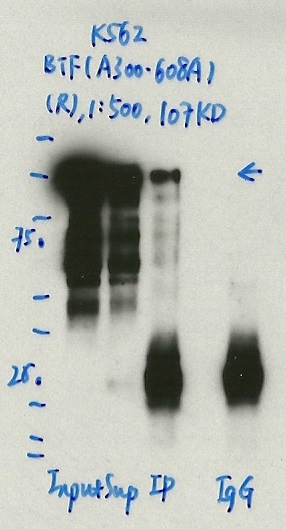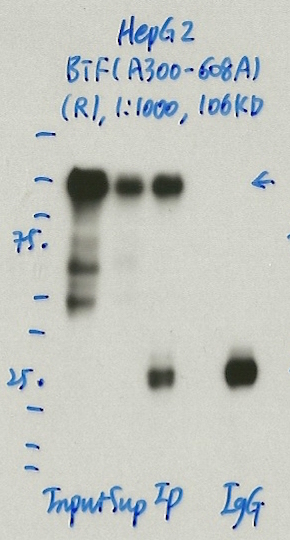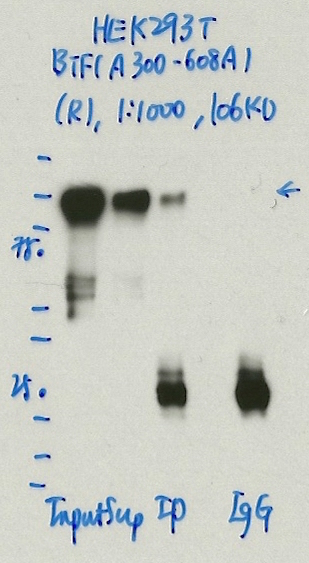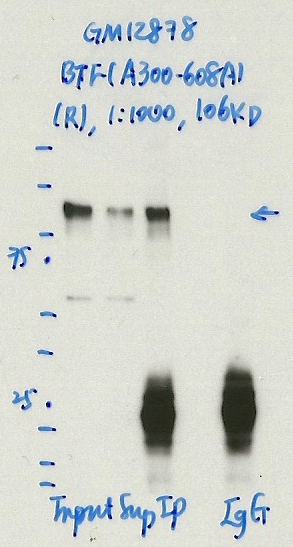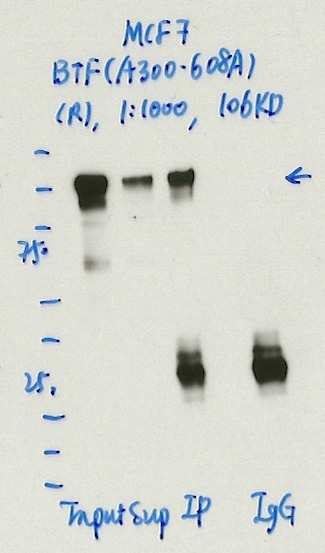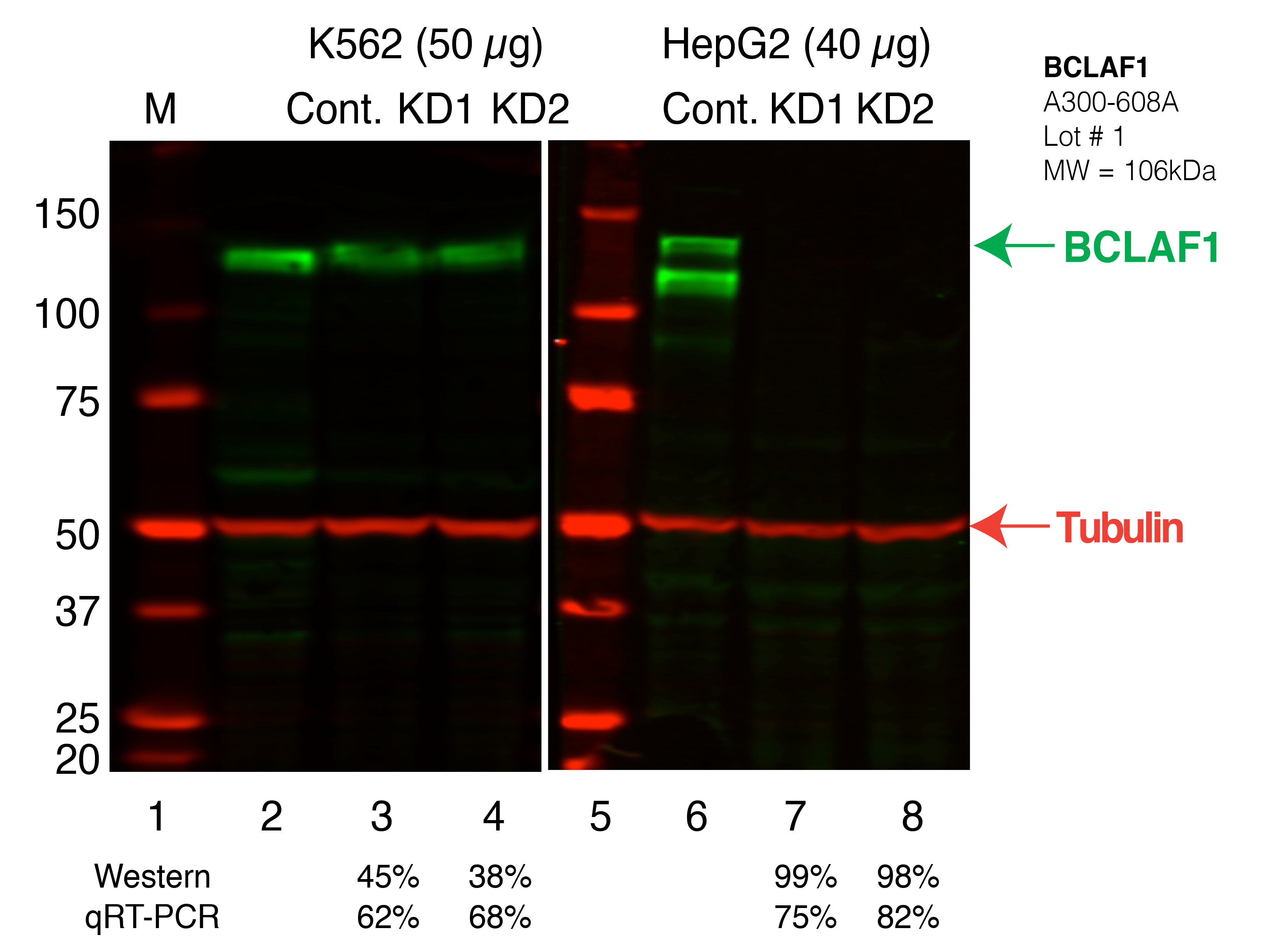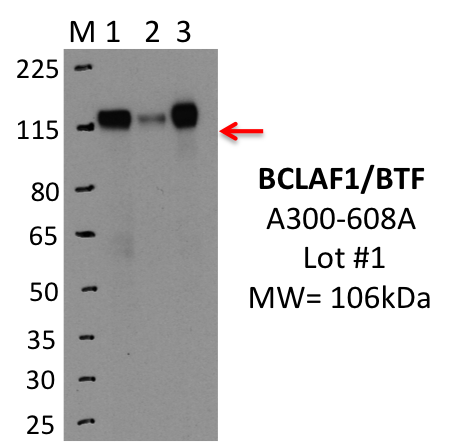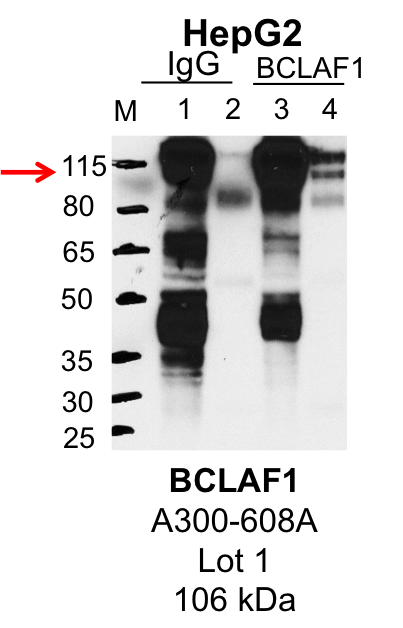ENCAB012FUX
Antibody against Homo sapiens BCLAF1
Homo sapiens
HepG2
characterized to standards
Homo sapiens
HEK293T, GM12878, MCF-7, K562
characterized to standards with exemption
Homo sapiens
any cell type or tissue
partially characterized
- Status
- released
- Source (vendor)
- Bethyl Labs
- Product ID
- A300-608A
- Lot ID
- 1
- Characterized targets
- BCLAF1 (Homo sapiens)
- Host
- rabbit
- Clonality
- polyclonal
- Purification
- affinity
- Isotype
- IgG
- External resources
Characterizations
BCLAF1 (Homo sapiens)
K562
exempt from standards
- Caption
- Immunoprecipitation was performed on nuclear extracts from the cell line: K562 using the antibody A300-608A. The image shows western blot analysis of input, flowthrough, immunoprecipitate, and mock immunoprecipitate using IgG. Target molecular weight: 106.122.
- Submitter comment
- We think the signal runs higher than at the expected size possibly because BCLF1 can have binary interactions with BCL2 (~22-29kD) and EMD (~28kD): http://www.uniprot.org/uniprot/Q9NYF8#interaction. See also ENCAB733KID.
- Reviewer comment
- Not within 20% of expected size
- Submitted by
- Nathaniel Watson
- Lab
- Michael Snyder, Stanford
- Grant
- U54HG006996
- Download
- 1095_07_BTF_A300-608A.jpg
BCLAF1 (Homo sapiens)
HepG2
exempt from standards
- Caption
- Immunoprecipitation was performed on nuclear extracts from the cell line: HepG2, using the antibody A300-608A. The blot shows western blot analysis of input, flowthrough, immunoprecipitate and mock immunoprecipitate using IgG.Molecular Weight: 106.122
- Submitter comment
- We think the signal runs higher than at the expected size possibly because BCLF1 can have binary interactions with BCL2 (~22-29kD) and EMD (~28kD): http://www.uniprot.org/uniprot/Q9NYF8#interaction. See also ENCAB733KID.
- Reviewer comment
- Not within 20% of expected size
- Submitted by
- Nathaniel Watson
- Lab
- Michael Snyder, Stanford
- Grant
- U54HG006996
- Download
- 1114_09_BTF_A300-608A.jpg
BCLAF1 (Homo sapiens)
HEK293T
exempt from standards
- Caption
- Immunoprecipitation was performed on nuclear extracts from the cell line: HEK293T, using the antibody A300-608A. The blot shows western blot analysis of input, flowthrough, immunoprecipitate and mock immunoprecipitate using IgG.Molecular Weight: 106.122
- Submitter comment
- We think the signal runs higher than at the expected size possibly because BCLF1 can have binary interactions with BCL2 (~22-29kD) and EMD (~28kD): http://www.uniprot.org/uniprot/Q9NYF8#interaction. See also ENCAB733KID.
- Reviewer comment
- Not within 20% of expected size
- Submitted by
- Nathaniel Watson
- Lab
- Michael Snyder, Stanford
- Grant
- U54HG006996
- Download
- 1114_10_BTF_A300-608A.jpg
BCLAF1 (Homo sapiens)
GM12878
exempt from standards
- Caption
- Immunoprecipitation was performed on nuclear extracts from the cell line: GM12878, using the antibody A300-608A. The blot shows western blot analysis of input, flowthrough, immunoprecipitate and mock immunoprecipitate using IgG.Molecular Weight: 106.122
- Submitter comment
- We think the signal runs higher than at the expected size possibly because BCLF1 can have binary interactions with BCL2 (~22-29kD) and EMD (~28kD): http://www.uniprot.org/uniprot/Q9NYF8#interaction. See also ENCAB733KID.
- Reviewer comment
- Not within 20% of expected size.
- Submitted by
- Nathaniel Watson
- Lab
- Michael Snyder, Stanford
- Grant
- U54HG006996
- Download
- 1116_09_BTF_A300-608A.jpg
BCLAF1 (Homo sapiens)
MCF-7
exempt from standards
- Caption
- Immunoprecipitation was performed on nuclear extracts from the cell line: MCF-7, using the antibody A300-608A. The blot shows western blot analysis of input, flowthrough, immunoprecipitate and mock immunoprecipitate using IgG.Molecular Weight: 106.122
- Submitter comment
- We think the signal runs higher than at the expected size possibly because BCLF1 can have binary interactions with BCL2 (~22-29kD) and EMD (~28kD): http://www.uniprot.org/uniprot/Q9NYF8#interaction. See also ENCAB733KID.
- Reviewer comment
- Not within 20% of expected size
- Submitted by
- Nathaniel Watson
- Lab
- Michael Snyder, Stanford
- Grant
- U54HG006996
- Download
- 1116_10_BTF_A300-608A.jpg
BCLAF1 (Homo sapiens)
compliant
- Caption
- Western blot following shRNA against BCLAF1 in K562 and HepG2 whole cell lysate using BCLAF1 specific antibody. Lane 1 is a ladder, lane 2 is K562 non-targeting control knockdown, lane 3 and 4 are two different shRNAs against BCLAF1. Lanes 5-8 follow the same pattern, but in HepG2. BCLAF1 protein appears as the green band, Tubulin serves as a control and appears in red.
- Submitted by
- Xintao Wei
- Lab
- Brenton Graveley, UConn
- Grant
- U54HG007005
- Download
- BCLAF1_Secondary_Western.png
BCLAF1 (Homo sapiens)
not submitted for review by lab
- Caption
- IP-WB analysis of K562 whole cell lysate using BCLAF1 specific antibody. Lane 1 is 2.5% of 0.5mg input lysate, lane 2 is 2.5% of supernatant after immunoprecipitation and Lane 3 is 50% of IP enrichment using rabbit polyclonal anti-BTF antibody. This antibody passes preliminary validation and will be further pursued for primary and secondary validation.
- Submitted by
- Balaji Sundararaman
- Lab
- Gene Yeo, UCSD
- Grant
- U54HG007005
- Download
- Bethyl_A300-608A_1_BCLAF1.png
BCLAF1 (Homo sapiens)
HepG2
compliant
- Caption
- IP-Western Blot analysis of HepG2 whole cell lysate using BCLAF1 specific antibody. Lane 1 is 1% of twenty million whole cell lysate input and lane 2 is 25% of IP enrichment using rabbit normal IgG (lanes under 'IgG'). Lane 3 is 1% of twenty million whole cell lysate input and lane 4 is 10% IP enrichment using rabbit polyclonal anti-BCLAF1 antibody (lanes under 'BCLAF1').
- Submitted by
- Steven Blue
- Lab
- Gene Yeo, UCSD
- Grant
- U54HG007005
- Download
- HepG2_Bethyl_A300-608A_1_BCLAF1.png
